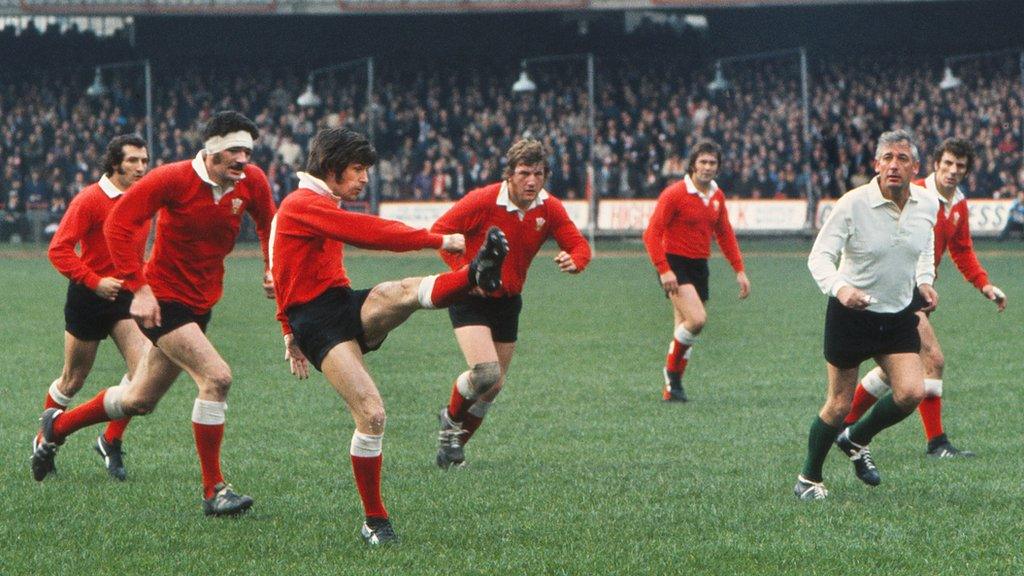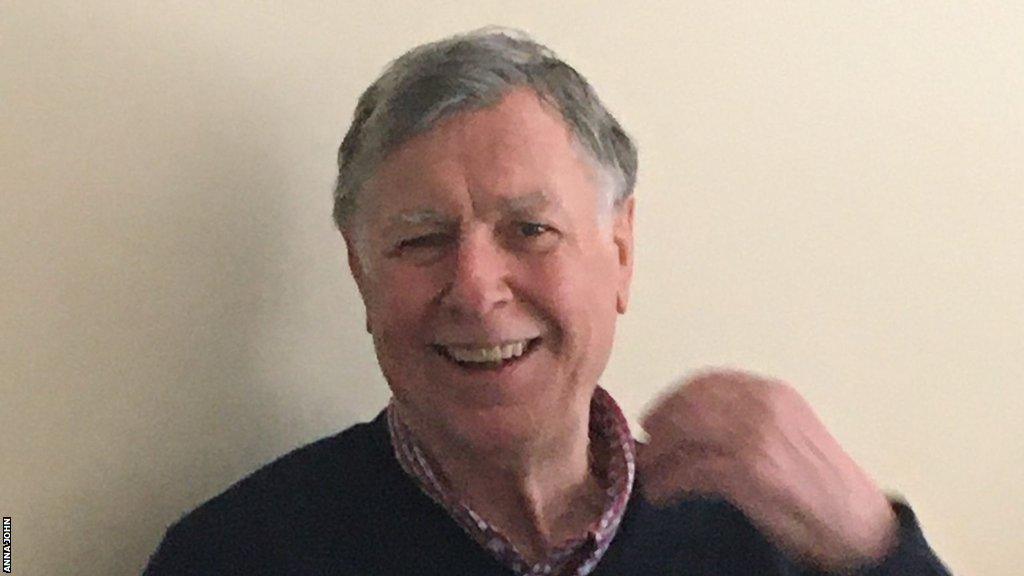Barry John: Legendary Wales and Lions fly-half dies aged 79
- Published
- comments

Barry John's final international was a victory against France in 1972
Barry John, the legendary former Cardiff, Wales and British Lions fly-half, has died aged 79.
After making his debut in 1966, John played in 25 internationals for Wales and five Tests for the Lions.
A family statement read: "Barry John died peacefully today at the University Hospital of Wales surrounded by his loving wife and four children.
"He was a loving Dadcu [grandfather] to 11 grandchildren and a much-loved brother."
Wales won three Five Nations titles, a Grand Slam and two Triple Crowns during his stint on the international stage.
John cemented his Lions legacy against the All Blacks in 1971 by playing a starring role in the historic 2-1 win over the hosts, who dubbed him 'The King'.
He retired the following year aged just 27.
John was central to Wales' 1971 Grand Slam - their first since 1952 - sealed by a 9-5 win against France in Paris, their first there for 14 years.
He made his debut as Wales lost to Australia in Cardiff in December 1966, and had to wait almost a year before partnering scrum-half Sir Gareth Edwards for the first time in a 13-6 home defeat by New Zealand.
John and his former Cardiff and Lions team-mate Edwards are regarded as one of the greatest half-back partnerships in rugby history.
Both had roots in west Wales and had the option of pursuing football careers before settling with the oval ball.
Edwards continued to flourish after John's retirement, but the loss of his half-back partner was long lamented by fans globally.
John finished with 120 points for Wales and the Lions in his 30 internationals, but was a rugby genius that amounted to so much more than facts and figures.

John made his Wales debut against Australia in 1966
John is the second Welsh 1970s legend who has died this year following the passing of full-back JPR Williams.
Tributes flowed in the wake of his passing. Welsh Rugby Union president Terry Cobner believes John is probably the greatest Wales fly-half.
"To be crowned 'The King' in New Zealand when every back-row forward in both the North and South Islands is trying to take your head off is quite some accolade," said former Wales and Lions flanker Cobner.
"For me, he has got to be right up there among the greatest outside halves who have ever played the game, probably the greatest.
"He was a glider, rather than a sidestepper, who had a subtle change of pace and direction. Coming on top of the recent deaths of Brian Price and JPR Williams, this is another huge blow for Welsh rugby.
"After what he did for Wales and the Lions in 1971, those of us who followed him into both teams always felt we had huge shoes to fill. He was and will remain a legend of our game."
Former Wales fly-half Jonathan Davies also paid his respects.
Allow X content?
This article contains content provided by X. We ask for your permission before anything is loaded, as they may be using cookies and other technologies. You may want to read X’s cookie policy, external and privacy policy, external before accepting. To view this content choose ‘accept and continue’.
"To be nicknamed 'The King', I think that says it all, especially in New Zealand," said Davies.
"I was very fortunate, I met Barry when I was very young. I went to the same school as Barry, obviously not at the same time.
"He was a legend, from the day I walked into those school gates.
"He had a grace and a style about him and certainly left a mark on the game.
"He was such a rugby intellect, to sit with him over a coffee and have a chat, pearls of wisdom would come out.
"Even when I was playing I used to meet him and he would advise me on a few things, it was great to sit there and listen to him.
"It's very sad. He was just a great player and a lovely man."
Former Wales and Lions captain Sam Warburton said John spanned the generations.
"In Wales, I can't express how high a regard people hold that 70s group, and in particular, people like Barry John, who was an absolute god of Welsh rugby," said Warburton.
"I heard the news today and it completely shocks you.
"What he contributed to the game, even now, 50 years later, still transcends rugby across the world and he hasn't picked up a ball for 50 years.
"It's just sheer testament to how much influence he had on the game when he played, but a massive loss and very sad news."
John's past teams commemorated one of their finest players.
Allow X content?
This article contains content provided by X. We ask for your permission before anything is loaded, as they may be using cookies and other technologies. You may want to read X’s cookie policy, external and privacy policy, external before accepting. To view this content choose ‘accept and continue’.
Allow X content?
This article contains content provided by X. We ask for your permission before anything is loaded, as they may be using cookies and other technologies. You may want to read X’s cookie policy, external and privacy policy, external before accepting. To view this content choose ‘accept and continue’.
Allow X content?
This article contains content provided by X. We ask for your permission before anything is loaded, as they may be using cookies and other technologies. You may want to read X’s cookie policy, external and privacy policy, external before accepting. To view this content choose ‘accept and continue’.
Allow X content?
This article contains content provided by X. We ask for your permission before anything is loaded, as they may be using cookies and other technologies. You may want to read X’s cookie policy, external and privacy policy, external before accepting. To view this content choose ‘accept and continue’.